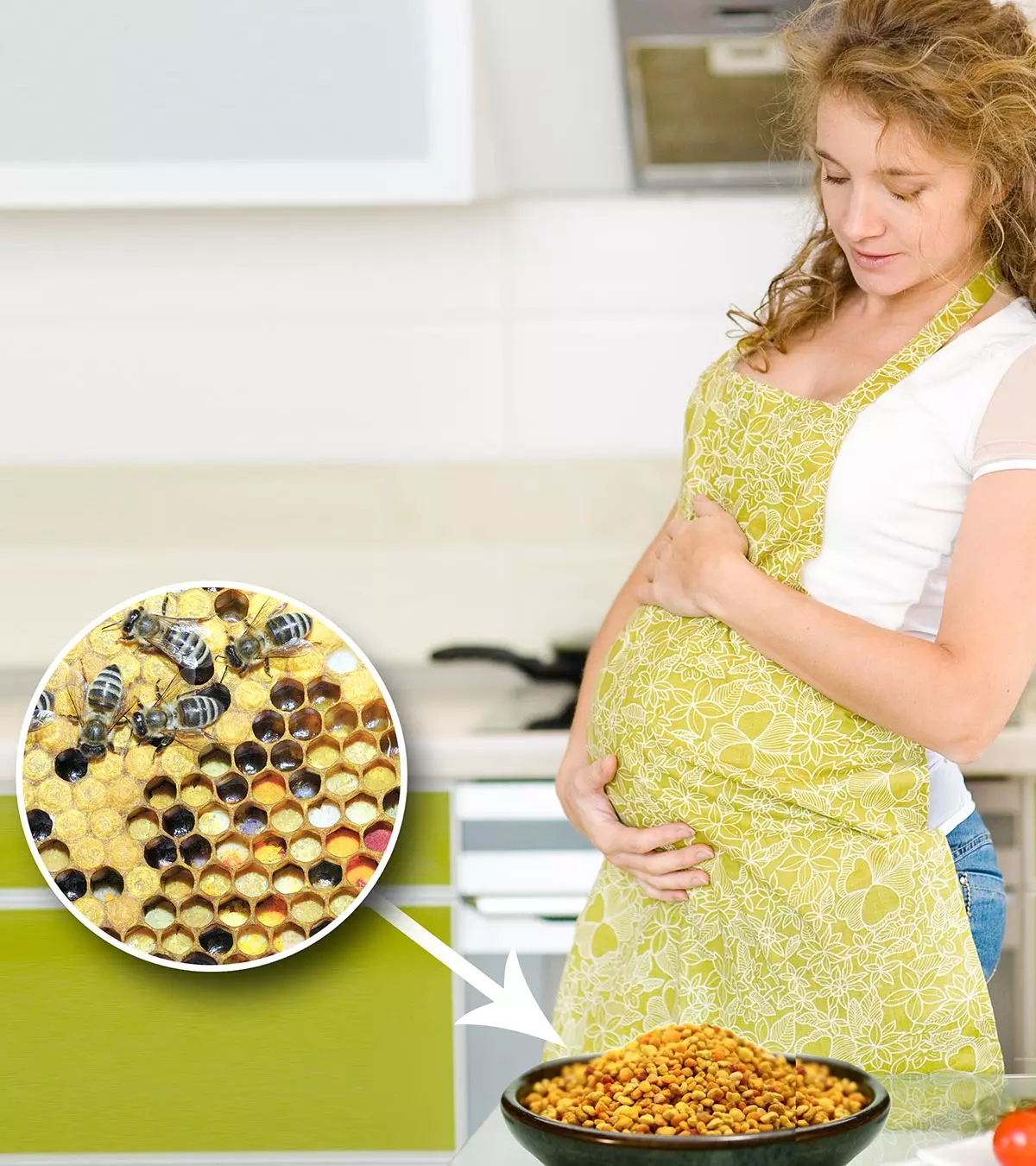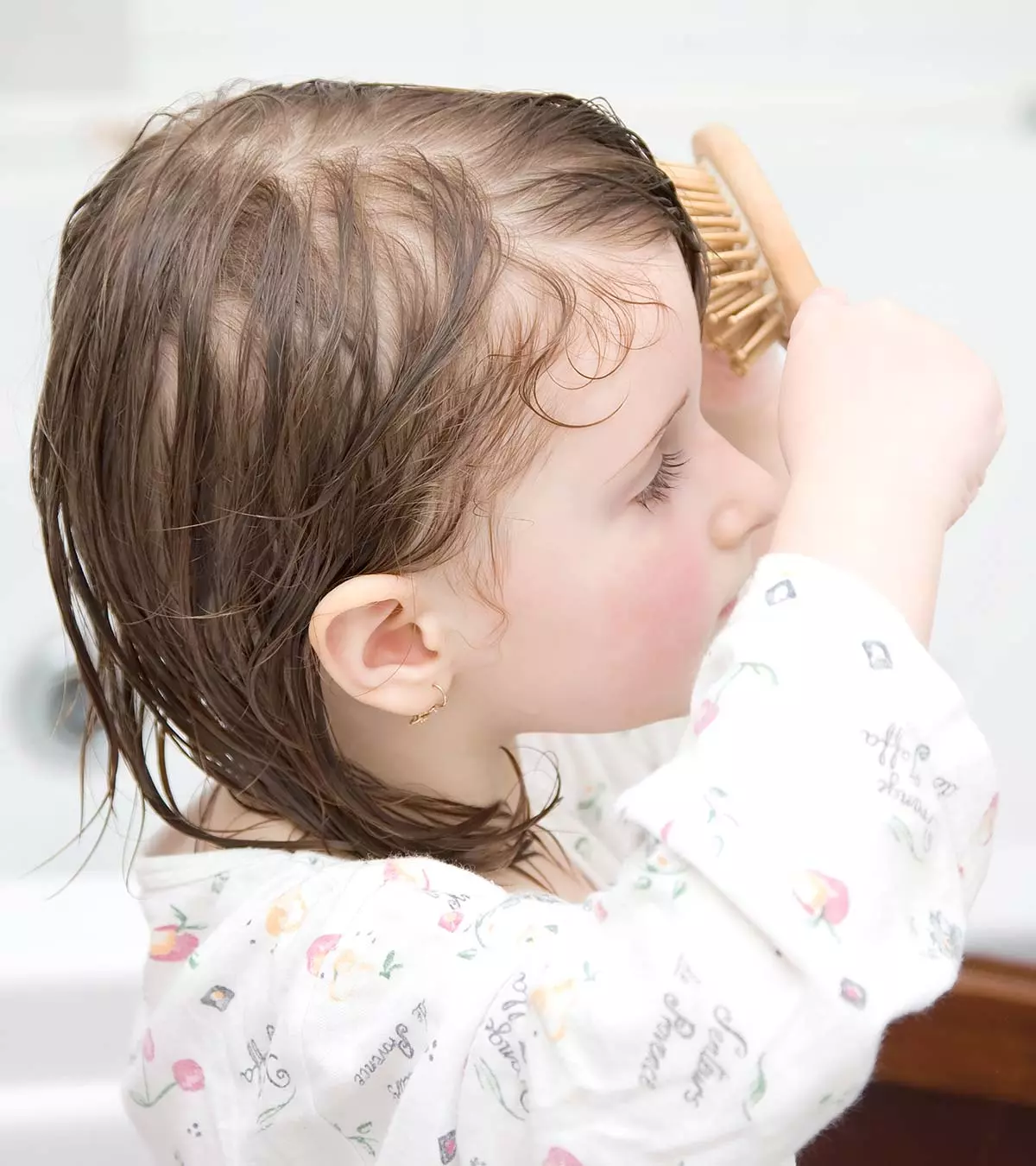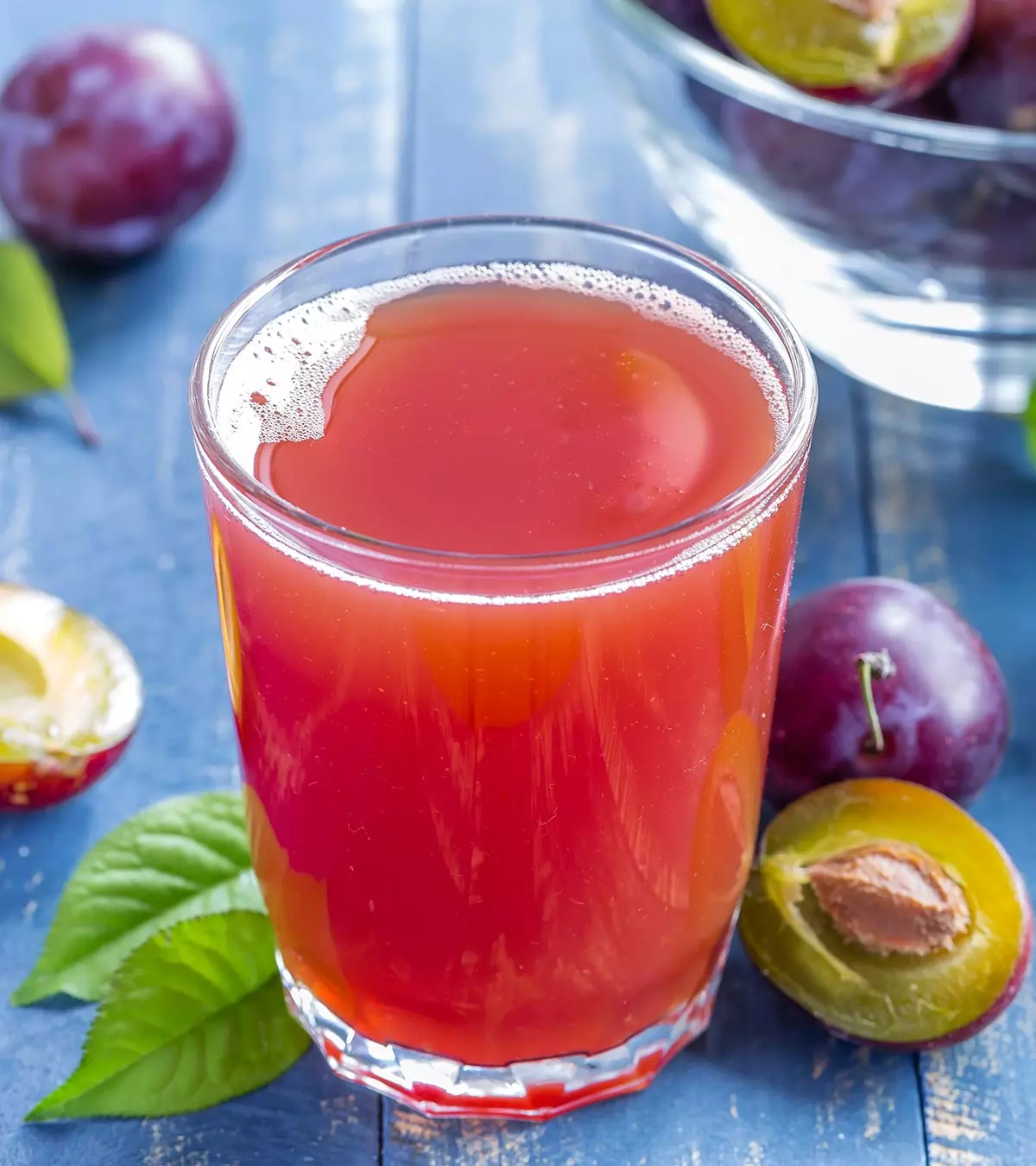
Image: Shutterstock
Prunes are dried European plums. Due to their natural laxative properties, you can use prune juice to treat constipation in toddlers. Since children mostly develop digestion problems due to the consumption (or lack) of specific foods, adding prune juice to their diet can help prevent constipation. In addition, it is rich in nutrients and minerals, thus promoting their overall health and wellness.

Read on to learn more about the causes of constipation in children, the role of prune juice in treating constipation and providing relief in children, and some tasty recipes to make prune juice at home.
Key Pointers
- Constipation in toddlers can be caused by food sensitivities, poor hydration, poor dietary intake, and excessive consumption of white flour, and pasteurized dairy.
- Prune juice can reduce constipation in toddlers due to its medicinal and natural laxative properties.
- Prune juice improves bowel movement, softens stool,and combats cell-damaging free radicals.
- Dried prunes can be soaked, blended, diluted with water, milk, yogurt, or coconut milk, and combined with other fruit purees or juices for added flavor.
Symptoms Of Constipation In Toddlers
The following are some signs and symptoms of constipation in toddlers (1).
- Pooping less than twice a week
- Swelling or bloating in the abdomen
- Difficulty passing stool
- Pain or other symptoms like cramping and nausea when pooping.
- Diarrhea like poop in their underwear or bloody stools–these require prompt medical consultation.
Causes Of Constipation In Toddlers

There are several causes of constipation in toddlers, but the most prominent cause is diet. Constipation due to food sensitivities or imbalance in gut flora lasts longer. Other causes include:
- Inadequate water intake.
- Lack of intake of fiber, vegetables, and fruits.
- Excess intake of white flour foods or carbohydrates.
- Excess intake of cold foods such as frozen yogurt or ice-cream.
- Excess intake of pasteurized dairy products.
So, making dietary changes could be a remedy to help treat your little one’s constipation. We recognize this can be easier said than done when you have a toddler who refuses to comply with a healthier diet.
 Point to consider
Point to considerWhat Is Prune Juice?
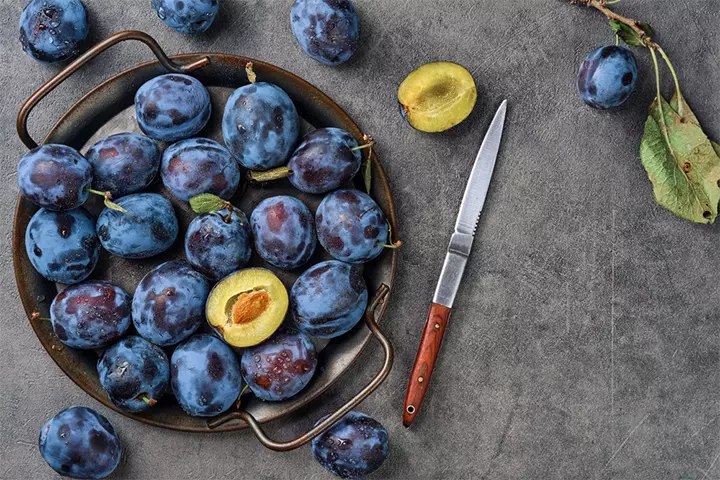
Prunus Domestica is the scientific name of European plum, which is easily available and helps cure several health conditions. Prune juice is prepared by soaking dried plum fruit in steam and then mixing it in a blender. Prune juice is natural, so it is a popular laxative for treating constipation in toddlers. Also, prunes are a rich source of nutrition and packed with minerals and vitamins, which help promote your toddler’s overall health.
Prune Juice For Constipation In Toddlers

Prunes are mild stimulants. Prune juice contains dihydroxyphenylisatin and dietary fiber, which help your toddler have normal and smooth bowel movements. Sorbitol and fiber in the juice soften the stool and prevent the symptoms of constipation. The juice helps to bring water into the colon, so the stool can move easier. Healthy enzymes and fiber in prune juice get your toddler’s digestive tract back on the track and promotes digestion after curing constipation. Also, consuming prune juice causes no problems in the colon of toddlers. Besides, prune juice is rich in antioxidants that combat cell-damaging free radicals. Offer a glass of prune juice before going to bed (3).
Noting her perspective on the effectiveness of prune juice for constipation, a mother of one remarks, “On Thanksgiving night, our child was so constipated and uncomfortable, we were up until 2 AM trying to comfort him. It was miserable; he couldn’t sleep at all. Finally, on Friday, we gave him some prune juice, and all was well in his world again (i).”
How To Prepare Prune Juice For Toddler Constipation?
You can prepare prune juice, or you blend prunes with other nutritious fruits and prepare a prune juice smoothie. Here are some prominent recipes of prune juice.
1. Pure prune juice
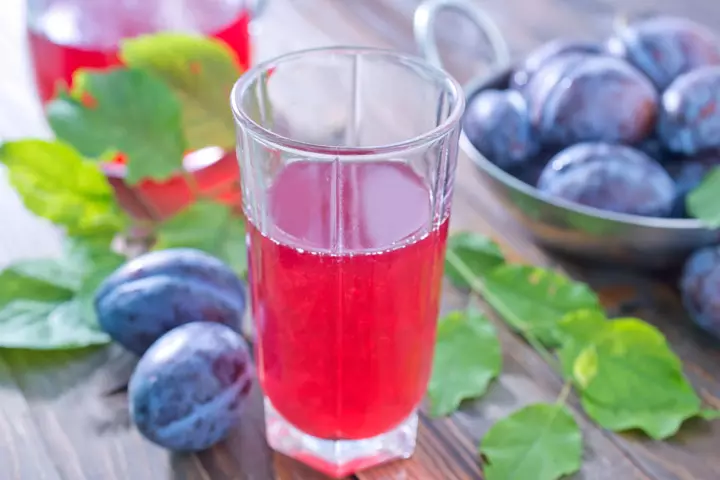
You Will Need:
- A handful of prunes
- ½ fresh lemon
- 1 cup of water
How To:
- Soak dried prunes in steam for some time.
- Take the prunes and mix them in a blender. Obtain pure prune puree.
- Obtain fresh lemon juice from a half lemon and add it.
- Add a cup of water to it and mix it well.
- Serve the fresh, pure prune juice to your toddler.
2. Prune-mango smoothie
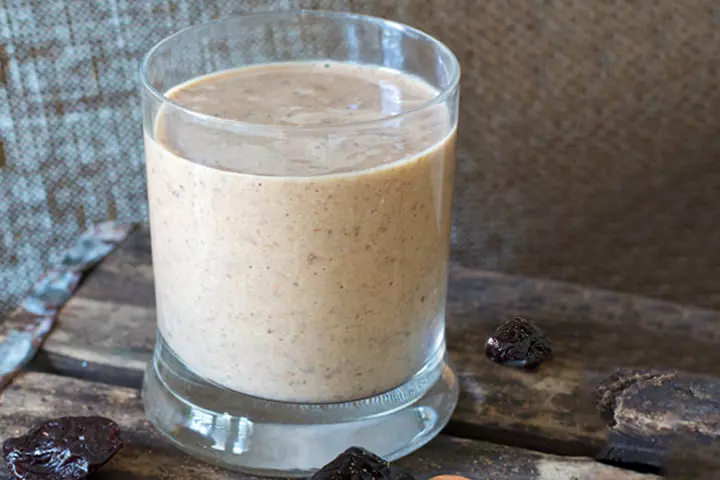
You Will Need:
- One mango, peeled
- Five prunes, chopped
- One orange, peeled
- 100 gms of yogurt
- 200 ml milk (monitor closely for dairy sensitivity)
How To:
- Add five prunes, mango, orange, yogurt, and milk in a liquidizer and obtain smooth juice.
- Pour it into glasses and serve immediately.
 Quick tip
Quick tip3. Prune juice smoothie with coconut milk and berries

You Will Need:
- ½ cup of pure coconut milk
- ¼ cup of mixed berries, all frozen
- One leaf of kale
- ½ cup of pure prune juice
- One tablespoon of flax seeds
How To:
- Add coconut milk, berries, kale leaf, prune juice, and flax seeds to a blender and blend everything till you obtain a smooth mixture.
- Pour mixed prune juice in a glass and offer it to your toddler.
- You can add water if your toddler prefers less concentrated juice.
Frequently Asked Questions
1. Can prune juice be mixed with other foods or drinks for toddlers with a picky palate?
Prune juice can be mixed with other foods or juices such as apple juice to enhance its flavor (4).
2. Can prune juice be given to a toddler who is lactose intolerant?
Prunes and prune juice work as natural supplements of calcium for lactose intolerant children and thus can be given to them.
3. Are there any side effects of giving prune juice to toddlers for constipation?
Occasional intake of prune juice to relieve constipation is not likely to cause any adverse effects in otherwise healthy toddlers. However, prune juice is rich in sorbitol, a natural sugar alcohol that acts as a laxative, and its excessive consumption can lead to gastrointestinal issues, including gas, bloating, and diarrhea. Although rare, it may trigger allergic reactions in sensitive individuals. Sometimes, increased bowel movement due to prune juice may cause diaper rash.
4. How long does it take for prune juice to relieve toddler constipation?
The time prune juice takes to relieve constipation may vary from one child to another. In some cases, it may make the toddler poop in a few hours; in others, it may take up to two to three days to take effect.
5. Can prune juice help with diarrhea in toddlers as well?
Prune juice is rich in the natural laxative sorbitol, which can exacerbate diarrhea and may worsen diarrhea symptoms by drawing more water into the intestines. Hence, prune juice should not be used to treat or manage diarrhea in toddlers.
6. What are some other health benefits of prune juice for toddlers besides relieving constipation?
Other than helping with the signs of constipation, prune juice also provides antioxidants and several essential nutrients, including iron, manganese, and vitamins A, C, and K, which can contribute to the healthy growth and development of the toddler (4).
Prune juice is known to have laxative properties. Thus, prune juice for constipation in toddlers helps improve their bowel movements and reduces the symptoms of constipation. Foods to relieve constipation in kids can further support healthy digestion and regularity. And due to their richness in sources of natural vitamins and minerals, they also aid in the overall development of the baby. Referring to the recipes by which you could include prune juice in your child’s diet, you can come up with several new ways to help them consume it and also bring an interesting variety to their taste buds.
Infographic: Relieving Constipation In Toddlers
Due to the natural laxative properties of prunes, they are commonly used in treating constipation. Moreover, as these fruits are loaded with fiber and antioxidants, they provide overall health benefits too. This infographic provides prune recipes for toddlers that will improve their digestion and help cure constipation.
Some thing wrong with infographic shortcode. please verify shortcode syntax
Personal Experience: Source
MomJunction articles include first-hand experiences to provide you with better insights through real-life narratives. Here are the sources of personal accounts referenced in this article.
i. A Xavier update.https://threebeastsonebaby.wordpress.com/tag/baby-photos/
References
- A Attaluri et al.; (2011); Randomised clinical trial: dried plums (prunes) vs. psyllium for constipation.
https://pubmed.ncbi.nlm.nih.gov/21323688/ - Constipation in Children.
https://www.hopkinsmedicine.org/health/conditions-and-diseases/constipation-in-children - Constipation in Children.
https://www.mayoclinic.org/diseases-conditions/constipation-in-children/diagnosis-treatment/drc-20354248 - Constipation Relief: Can Prune Juice Make You Poop?
https://health.clevelandclinic.org/prune-juice-for-constipation - Toddler Constipation.
https://my.clevelandclinic.org/health/diseases/17785-constipation-in-children
Community Experiences
Join the conversation and become a part of our nurturing community! Share your stories, experiences, and insights to connect with fellow parents.
Read full bio of Dr. Tashawna Stokes
Read full bio of Jessica Albert
Read full bio of Swati Patwal
Read full bio of Vidya Tadapatri









